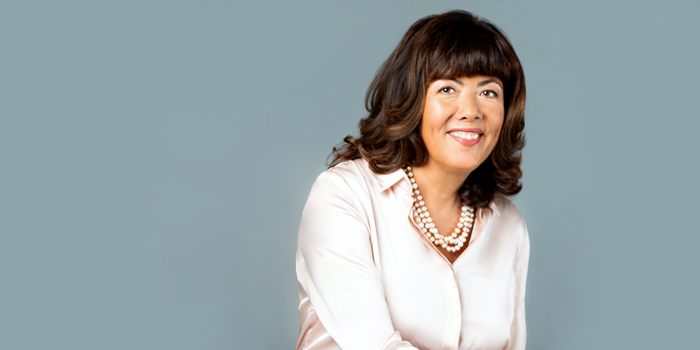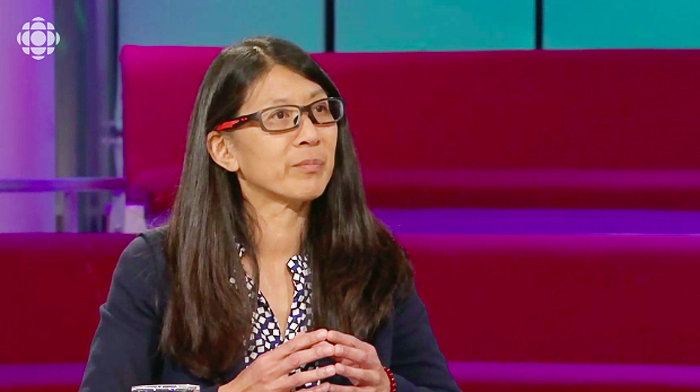
When seasoned corporate lawyer Dany Meloul, BCL’88, LLB’88, took the helm of Radio-Canada Télévision last October, no one could have predicted the unprecedented challenges she would have to face in her first year on the job. But the show(s) must go on!
From business to show business
Four years ago, Bell Media presented Dany Meloul with a formidable opportunity: would she step away from a twenty-seven-year legal career and jump fully into the broadcasting business? “You have to trust yourself to leave something that you know so well,” she shares. Meloul eagerly took on the challenge of serving as Vice-President of Programming, French-Language TV, for Bell Media. Just a few years later, it would lead her to become la grande dame of Radio-Canada’s television division.
To Meloul, her atypical career is proof of a legal department’s strategic importance to any organization. “It’s the one function that sees everything; if you are interested in the business and content production, there are opportunities for you to play a role.”
While her change of path may have seemed dramatic, she explains that it took shape organically. Her experience as in-house counsel over nearly three decades allowed her to gradually build the interest and knowledge that lead to her first programming role back in 2015.
Headlining Radio-Canada
|
“Sitting on a meeting where you are pitched a story, deciding if we are going to develop it, which stars we are going to feature, the whole creative discussion… that is the treat for me“
|
Since taking the helm at Radio-Canada television, a typical day for Meloul involves pouring over programming grids and ratings, discussions with producers, and analyzing budgets against advertising revenues; “A lot of meetings!” she laughs. Her favorite part is working with the creative side of the business. “Sitting in a meeting where you are pitched a story, deciding whether to develop it, which stars to feature, the whole creative discussion… that is the treat for me, I would never have had that exposure in any other realm.”
The television industry is also undergoing deep, and often challenging, transformations. “Radio-Canada has a mandate: informer et divertir. While I certainly don’t want to imply that ‘informing’ is easier, it is more straightforward; we have a very solid news organization that garners a lot of credibility with the public. But ‘entertaining’ has become very competitive with the disruption caused by different streaming services,” she explains. “We want Francophones to stay close to their identity, their culture, and their star system, so we spare no efforts to ensure viewers will be interested in our content for generations to come.”
TV in the time of COVID-19
When COVID-19 struck, the most immediate challenge for Radio-Canada was that all sets were closed. “We had to figure out how to continue doing new and innovative television with minimal production,” Meloul recalls. As the crown corporation owns its studios, they decided to control what they could. “We sanitized our studios, put up plexiglass in the control room, and established a protocol to ensure that some programs could continue without a live audience.”
An early decision that proved to be crucial involved treating the divertir part of Radio-Canada’s mandate as an essential service on the same level as informer. “At the beginning of the pandemic, audiences were so focused on consuming news that we were asked why we bothered continuing to produce talk shows, variety shows, and such,” she says. Outstanding ratings and public feedback on social media have since shown that Radio-Canada made the right choice. “People are craving a respite from everything that is going on in the world,” Meloul explains.

The decision has also impacted Quebec during the pandemic in ways they never could have predicted, notably through influential talk-show Tout le monde en parle. “[Former Médecin sans frontières international president] Dr Johanne Liu came on the show and declared that, years from now, what people will remember from the pandemic is that their parents had to die alone; the next day, government made changes to the restrictions preventing people from visiting a dying relative. It’s a show that has the power to change the discourse of society,” Meloul says.
The shows will go on
In conversation, Meloul showed Focus a massive fall programming grid that was hand drawn on a white board in her home office. “Through our experiments this spring, we were able to develop a thoughtful process, and we can now be confident in our ability to bring back anything shot in a studio setting,” she shares. Fiction remains a challenge (“You can hardly shoot a love scene with a plexiglass between your leads!”), so Radio-Canada is working with the Association Québécoise des producteurs médiatiques to establish protocols. “Perhaps it won’t be at quite the same cadence, but some productions will undoubtedly resume over the summer,” Meloul believes.
Meloul’s prediction is that the pandemic will provide some valuable long-term lessons on the ways quality television can be produced with fewer means. However, she also suspects that the pendulum will swing away from much of the minimalist content that is currently shared on social media. “We are finding out that our sets might only need six cameras, instead of twelve. But the content produced by artists alone in their house, sharing their music or comedy for free on social media, is not a long-term replacement to the entertainment we are used to.
We are all very grateful that they are giving so much of themselves in this way, but it will not be sustainable to continue to receive everything for free. Audiences want the full-scale professional productions we’ve had in the past.” Creatives are already hard at work, pitching innovative concepts for productions that can respect social distancing guidelines.
Being a lawyer in business
|
“[The study of law] teaches you to zero in on the important stakes of any situation; business people who are also lawyers stand out because of that skill”
|
Even though her office is now outside the legal department, Meloul feels like her legal background makes a difference in her job every day. “By studying law, you develop a very high level of critical thinking; it teaches you to zero in on the important stakes of any situation; business people who are also lawyers stand out because of that skill”. This is an invaluable asset, particularly for a TV executive whose daily routine often involves turning seemingly insurmountable problems into clear solutions.
For this reason, her advice to young lawyers aspiring to a creative career is to first hone their legal skills: “You went to law school for a reason; get a few years of experience under your belt. You don’t necessarily need twenty-seven years like me [laughs] but you need a few, because it will be your difference. It will become your brand, your calling card into a meeting. Don’t be rushed.”
Interview: Karell Michaud.
